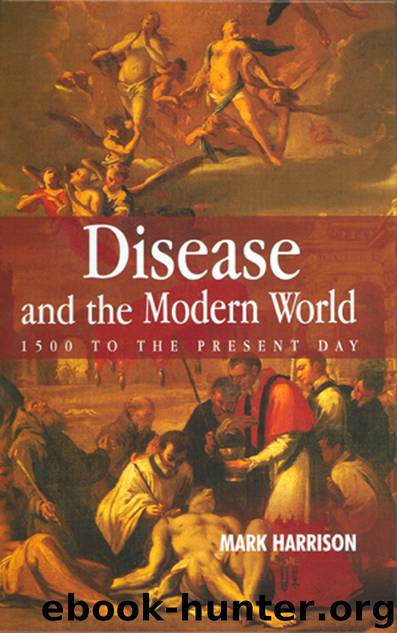Disease and the Modern World by Mark Harrison

Author:Mark Harrison
Language: eng
Format: epub
Publisher: Wiley
Published: 2011-04-19T16:00:00+00:00
Urban disease and sanitary reform
As the most dramatic of the epidemic diseases that afflicted industrialized countries, cholera has long been seen as the chief stimulus to the great sanitary reforms of the nineteenth century. Certainly, few diseases produced as much fear as cholera, and few illustrated so clearly the interdependence of rich and poor. But cholera may have been more of a distraction than an impetus to sanitary reform. Sanitarians had to work hard on public opinion in order to use it for their own ends, and their main concern was not so much cholera but the epidemics of fever that appeared regularly in industrial cities. As a cause of death and debility, cholera was surpassed by ‘continued fever’ (a term which then embraced typhus, relapsing fever and typhoid), scarlet fever, smallpox and measles. These epidemic diseases killed fewer people than chronic maladies such as tuberculosis. Reformers thus sought to treat cholera as merely one among many fevers that thrived in the squalour of their towns and cities. The fact that an Asiatic fever could flourish in Europe was a sign that it was not yet fully civilized or, indeed, that it may have degenerated.70
But the unhealthiness of large conurbations was hardly a revelation. Throughout the eighteenth century, medical men pointed to the close relationship that existed between poverty, filth and disease, but governments had shown little inclination to intervene in matters of public health, and the urban environment remained the responsibility of local authorities. A few authorities managed to achieve a good deal, but mostly in older, richer towns. The industrial towns that developed rapidly from the late eighteenth century generally lacked strong local government, and were unable to cope with the filth generated by large numbers of humans and animals newly brought together. Partly in response to these conditions, the state began to take a more active role. Britain – the first nation to industrialize and hence to experience these problems – led the way, but other industrializing nations like France, Germany and the United States soon followed suit. By the end of the nineteenth century, sanitation had become an index of civilization across the Western world.
Today, most people have a very specific conception of what sanitation entails. It has become synonymous with sewers and other great feats of Victorian engineering, with pure water and the removal of slums. But at the beginning of the nineteenth century, the word ‘sanitary’ had no fixed meaning. It was used loosely, if at all, to describe anything pertaining to health.71 It was by no means inevitable that sanitary reform would become synonymous with sanitary engineering, or even that the state would intervene in any way to counteract the problems of urban squalour. Lest we regard sanitary reform as inevitable, we should remember that, even today, different peoples are prepared to tolerate different degrees of ‘filth’. Moreover, what people understand by ‘filth’ is not the same the world over, but is a reflection of what is deemed unacceptable within their particular system of values.
Download
This site does not store any files on its server. We only index and link to content provided by other sites. Please contact the content providers to delete copyright contents if any and email us, we'll remove relevant links or contents immediately.
| Africa | Americas |
| Arctic & Antarctica | Asia |
| Australia & Oceania | Europe |
| Middle East | Russia |
| United States | World |
| Ancient Civilizations | Military |
| Historical Study & Educational Resources |
Cecilia; Or, Memoirs of an Heiress — Volume 1 by Fanny Burney(32548)
Cecilia; Or, Memoirs of an Heiress — Volume 2 by Fanny Burney(31947)
Cecilia; Or, Memoirs of an Heiress — Volume 3 by Fanny Burney(31932)
The Secret History by Donna Tartt(19053)
Sapiens: A Brief History of Humankind by Yuval Noah Harari(14370)
Leonardo da Vinci by Walter Isaacson(13318)
The Radium Girls by Kate Moore(12018)
Sapiens by Yuval Noah Harari(5366)
How Democracies Die by Steven Levitsky & Daniel Ziblatt(5216)
The Wind in My Hair by Masih Alinejad(5092)
Homo Deus: A Brief History of Tomorrow by Yuval Noah Harari(4908)
Endurance: Shackleton's Incredible Voyage by Alfred Lansing(4769)
Man's Search for Meaning by Viktor Frankl(4585)
The Silk Roads by Peter Frankopan(4526)
Millionaire: The Philanderer, Gambler, and Duelist Who Invented Modern Finance by Janet Gleeson(4469)
The Rape of Nanking by Iris Chang(4203)
Joan of Arc by Mary Gordon(4101)
The Motorcycle Diaries by Ernesto Che Guevara(4089)
Stalin by Stephen Kotkin(3957)
